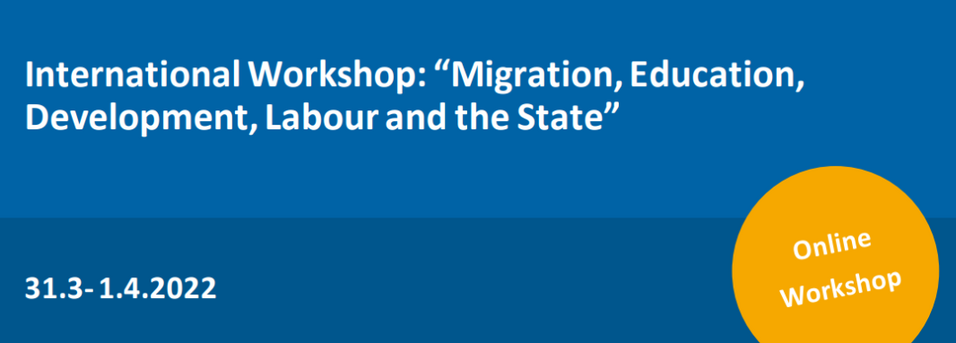Aims and concept of the Workshop "Migration, Education, Development, Labour and the State"
This International Workshop puts a focus on situations of intense entanglement between migration and education. Both notions are understood in a large sense: migration including temporary migration, education including all-sided education (to a citizen of a certain type, to a certain "civilized" behaviour) beyond formalized education or training. In this wide understanding, potentially enter all forms of educational and of labour migration. The State (or International Organization or Non-State Organization or Party) enters as a provider of education. We aim at situations in which the intervention of such actors aim at the education of (temporary) migrants, in which migration is seen as a chance for transforming the individual. We also ask for educational and "civilizing" concepts put into motion by these flows of migration. We focus on organized - framed by States or organizations - and temporary forms of migration. We aim at the post-colonial era, the period of system competition, with a special focus on the Socialist World System. We may also integrate flash-backs into anterior periods featuring formative elements for the scrutinized constellations of Migration, Education, Labour and the State.
Programme (pdf)
Diskussion zur Globalgeschichte der Entwicklungspolitik und
Buchpräsentation „In Diensten des afrikanischen Sozialismus. Tansania und die globale Entwicklungsarbeit der beiden deutschen Staaten“
Zeit: Donnerstag, 31.03.2022, 18.30 Uhr
Ort: Elise-Richter-Saal, Universität Wien Hauptgebäude, 1. Stock, Stiege 1
Im Anschluss freuen wir uns auf eine informelle Weiterdiskussion mit Getränken.
Programm (pdf)
In den 1960er Jahren wurde "Entwicklung" zu einem universalen Ziel und umkämpften Politikfeld im globalen Spannungsverhältnis von Kaltem Krieg, Dekolonisierung und konkurrierenden Sozialismen. So auch in Tansania, wo die Regierung Tansanias beim Aufbau eines eigenständigen "Afrikanischen Sozialismus" auf Expertise, Kredite und Stipendien aus Ost wie West setzte. Wie übersetzten sich die Rivalitäten und konkurrierenden Ideen in die Praxis? Auf der Grundlage neu erschlossener Aktenbestände sowie zahlreicher Interviews zeichnet das Buch die Handlungsspielräume in der globalen Entwicklungsarbeit aus den Blickwinkeln der verschiedenen Akteure nach. Es zeigt auf, wie visionäre Zukunftsentwürfe in Politik und Alltag dem Primat ökonomischer Krisenbewältigung wichen und in ein Entwicklungsgeschäft mündeten. Wie lässt sich das Buch in den Stand der globalgeschichtlichen Forschung einordnen? Was sind Ergebnisse und Impulse für neue Perspektiven der Entwicklungsforschung? Wie bringen wir die Kommunikation zwischen diesen beiden Feldern der Forschung voran?
Mit dem Autor Dr. Eric Burton (Institut für Zeitgeschichte, Universität Innsbruck) diskutieren Dr. Lucile Dreidemy (Institut für Zeitgeschichte, Universität Wien) und Dr. Eva-Maria Muschik (Institut für Internationale Entwicklung, Universität Wien).
Moderation und Organisation: Univ.-Doz. Dr. Berthold Unfried (Institut für Wirtschafts- und Sozialgeschichte, Universität Wien)
Das Buch ist online und Open Access abrufbar: https://www.degruyter.com/document/doi/10.1515/9783110705621/html
(4.3.2022)

